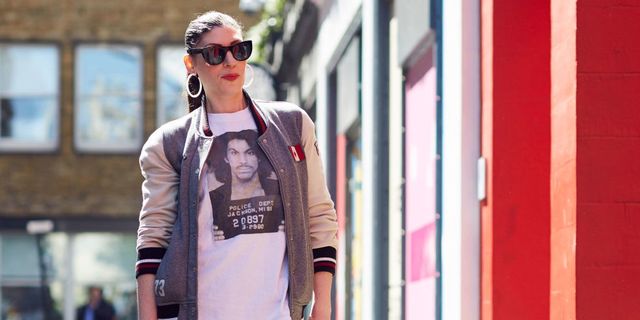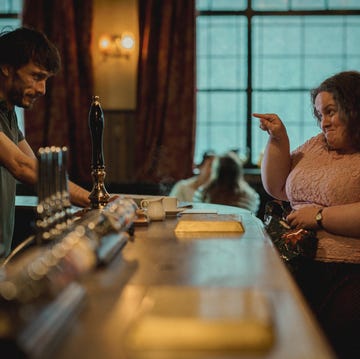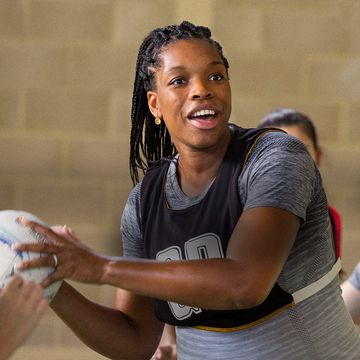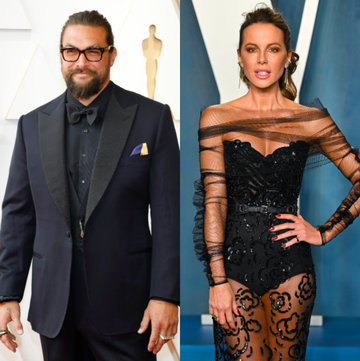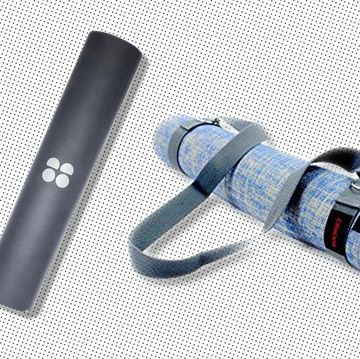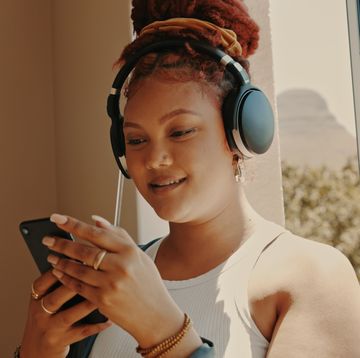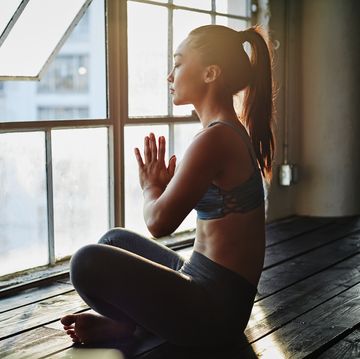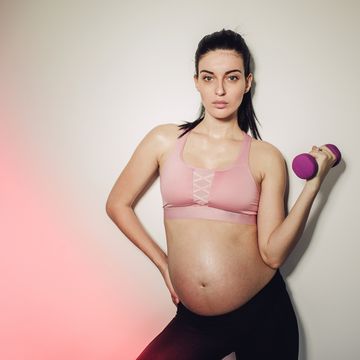Croissants. Cookies. Crisps. These aren't the kind of foods you would expect to find in the kitchen cupboard of a fitness editor and exercise fanatic.
But until recently, I've battled intense anxiety before meal times. I'm consistently amazed at how other people seem to make it through a day, navigating a billion food choices without having dozens of mini-meltdowns, like I do.
I'm not a foodie. It doesn't interest me. I don't have an adventurous palate, I don't get excited about taste. Figuring out how to eat and what to eat have caused me stress for as long as I can remember. I was a picky eater as a child, despite my parents' endless attempts to introduce me to new foods.
We'd eat dinner as a family every night – for example, chicken and vegetable stir-fries with rice – but my mother would have to make me a separate meal, such as plain chicken with potatoes. Yes, I was that child – always fussy. And I never grew out of it.
'It was so frustrating to have a fussy child,' says my mother. 'You can't understand why they don't want to eat. You cajole, try to sneak new things into meals, all to no avail.
'Feeling desperate and guilty, you give them what they like, which in Muireann's case was no veg, no sauces, no slimy textures, even foods she didn't like the look of, and hope that they grow out of their aversion to other food.'
I got away with it as a child, but at 35, it has long since ceased to be cute. I have a list of about 10 'safe foods' and I just eat those. Every day. I'm a spin instructor, teaching more than seven classes a week, I walk everywhere, try out new fitness classes all the time. I move – a lot. I should be eating around 2,000 calories a day.
In theory, I know I should be eating more, eating differently, adding variety, but the thought of trying to figure all that out is so overwhelming, I simply shut down when faced with the prospect of having to do it. Up to this point in my life, I've done a great job of hiding my fear of food. My friends know I'm picky and they've come to deal with it, albeit after several eye rolls. I avoid discussions about food whenever possible. As the Fitness Editor of ELLE I write a blog about fitness, but not once will you have heard me talk or write about food.
The rare occasions that I have discussed it, people will say, 'Just try some new things!' much like telling drug addicts to stop taking drugs. If only it were that easy. Being invited to friends' houses for dinner stresses me out. What if I don't like what they serve? Even if it's just pasta with sauce? I'll offend them, it'll affect our friendship. Going to restaurants is anxiety inducing; if there's nothing I like, will I have to go hungry? Then everyone's going to ask why I'm not eating. And how do I explain that I just can't?
This summer, my dog was diagnosed with cancer and given two months to live. All my time, energy and focus went straight to him. My own self-care went completely out the window. The way this manifested itself primarily was through my diet. I think I went weeks on end without giving myself a proper meal. I was loading up on sugary treats, skipping meals altogether. Trying to care for my dog and keep up my job, where I have to be a source of motivation and energy for everyone around me, was wearing me into the ground. I felt stressed, anxious, angry and exhausted. I finally realised that I just couldn't carry on and that adequate self-care means caring for yourself inside and out. It was time: I had to tackle the food issue.
Having admitted I have a problem, I sought the help of dietitian Lucy Jones of Channel 4's The Food Hospital.
Lucy patiently took notes as I talked about all my food concerns and almost ran out of paper when I listed all the foods on my 'no' list (tomatoes, avocados, cucumbers, aubergines, oranges and pretty much anything with a texture or smell I can't handle). When I finished, she told me my current way of eating was low in fibre, vitamins, minerals, fruit, vegetables and protein.
When I don't know what to eat, I resort to cookies and popcorn – these binge episodes are causing big peaks and troughs in my energy levels and are messing with my blood sugar levels, leaving me at risk of developing type-2 diabetes. The deficiency of any good vitamins and minerals also isn't great for my mental health and will amplify my stress. I'm also at risk of developing certain types of cancers and chronic ageing conditions, such as dementia.
And that, my friends, was my 'wake-up call'. I went in thinking I was a bit picky; I left realising my attitude to eating was seriously affecting my health. One of Lucy's main concerns was that I'm not fuelling myself for the very active life I lead.
Being a fitness professional and not having a handle on my own eating habits is embarrassing. One of my riders once asked me how many calories I refuel with after a class, to which I replied, 'How many calories are in an Oreo?'
In a world of #InstaFit, green smoothie drinking and six-packs, the pressure to conform can be pretty intense. I often get asked why I never post food photos on Instagram – it's seemingly unheard of for a fitness professional to show no interest in how to fuel your body. I can't stand looking at daily updates of fitness gurus' meals, and find the obsession with 'clean eating' to be even scarier than my own aversion to food (and unhealthier). I refuse to believe they're not sneaking a cupcake in there every now and then.
Lucy set goals for me to eat more regular meals and build variety into them. She also recommended I see a Cognitive Behavioural Therapist (CBT) to deal with my stress and anxiety around food. I've never seen a therapist and it hadn't occurred to me that this was the kind of thing one would need therapy for, but determined to get to the root of my problem, I dived in headfirst, and asked friends and acquaintances for therapist recommendations. No stigma, no shame, I just needed help.
Dan Kolubinski, Senior Therapist at Efficacy, one of the UK's leading CBT services, says the stress and anxiety I feel when faced with food situations is my fight or flight response kicking in: can I face this problem, or should I flee? CBT is about changing the way you approach the problem. That's achieved through systematic desensitisation, which in my case is putting myself in situations with food that make me feel uncomfortable, such as eating at a friend's house, and reassessing my decisions every step of the way. So rather than caving into the feeling of stress and not eating anything, I sit there, feel it, and maybe make a pact with myself to at least try one thing.
The notion of getting comfortable with being uncomfortable is interesting to me. I can do that with physical challenges – I can run a marathon and push through that pain for 26.2 miles – but my brain seems to short circuit when I feel uncomfortable around food. My palms get sweaty, my heart rate increases, I get flushed and flustered. This is probably due, in part, to my feelings of shame and embarrassment about my issue. 'People get away with being judgemental about it,' says Bee Wilson, author of First Bite: How We Learn to Eat. 'There's a conspiracy of silence and a real sense of shame around a disordered relationship with food.' She says even the words 'picky' and 'fussy' don't do the condition justice. It's neophobia: an active fear of trying new foods. I knew it! I've always felt this was some sort of eating disorder, but to describe it that way would be melodramatic.
Yet there is hope. Bee's book is a reminder that the human digestive system is flexible, so to speak – you can relearn how to eat. It's harder for some than others, but the key is in taking small steps, doing 'tiny tastings' of new foods. Just putting a tiny piece of avocado on my plate with the rest of my meal and trying that (even licking it counts). And I have to be patient and not beat myself up for struggling.
So I've started my journey to getting my eating habits under control. My dietitian, Lucy, helps me make the best dietary choices I can by assessing pictures of my meals that I upload to an app called Oviva (like WhatsApp for dietitians). I'm learning to deal with food situations that make me uncomfortable, and being open and honest with those around me about my struggles, rather than pretending they don't exist. So now, instead of pushing my food around my plate when we're dining out, I can explain why I have an issue with the food and we discuss it, then I get around to trying a little.
There is no quick fix for this. Many factors influence the way we eat and figuring out what works for you is an intensely personal journey. The answers don't lie in whatever the Instagram nutritionists deem is the dietary fad of the day or in 'eat clean, train dirty' memes. It's worth seeking out professional help and being patient with yourself as you make changes that may be overwhelming for you. Mainly, if you've suffered with a fear of food for too long, don't be scared to talk about it – there are more of us out there than you might think.
For more information on CBT, visit cognitivebehaviourtherapy.co.uk
Related Content:
Social Media Campaign Celebrates Positive Body Image For Eating Disorder Awareness Week
